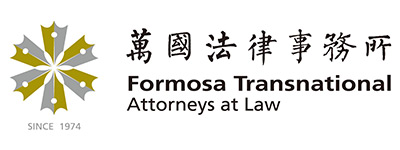Japan has always been active in investing in Taiwan, with 11,654 investments totalling about USD25.9 billion by the end of 2022. Although this number is almost the same as in the US, the number of Japanese investments in Taiwan far exceeds that of the US, with 7,694 investments.
The number of Japanese investments is almost the same as in Hong Kong, but the total value of investments is much higher, with the total value of investments in Hong Kong around USD10.37 billion. In terms of the number of Japanese investments, Taiwan accounts for about 17.5% of total foreign investment, in second place, while in terms of total investment it accounts for about 12.4%, or the fourth-biggest destination of total foreign investment.

Partner
Formosa Transnational
Taipei
Email: albert.kao@taiwanlaw.com
Historically, Japan has actively invested in Taiwan since the lifting of the ban on foreign investment in 1952, and has been maintaining stable investments since then. In the late 1980s, during the Japanese asset price bubble, the number of investments reached an order of magnitude, with 40% of total investments every year. In the 2000s, there was an average of 200-300 Japanese investments annually.
In the 2010s, the average number of Japanese investments in Taiwan increased to 400, and reached a peak in 2012 and 2013, with 619 and 618 investments, respectively. This development momentum was halted by the covid-19 pandemic and, since 2020, the number of investments has returned to the 200 level, indicating a considerable decline in both the number and value of investments.
Despite the decline in recent years, Taiwan has been a preferred overseas destination for Japanese manufacturing industries from an early stage due to its ability to provide quality labour. The island has also been considered an ideal production base for advanced science and technology such as semiconductors due to relatively low electricity and water rates for industrial use.
In addition, due to historical and geographical reasons, Japanese food and culture are relatively easily accepted in Taiwan, making it easier for the catering, retail, hotel and other service industries to successfully establish themselves in Taiwan. However, external factors such as Japanese tensions in relations with China, and trade friction between the US and China, may weaken the investment sentiment in Taiwan, but the author expects a V-shaped recovery in Japanese investment in Taiwan.
COMPREHENSIBLE REGULATIONS

Partner
Formosa Transnational
Taipei
Email: wenchih.chen@taiwanlaw.com
For Japanese companies, Taiwan’s corporate law system is relatively easy to understand, and the types and structure of the company bodies are similar to that of Japan’s commercial law. Private companies are composed of a shareholder meeting, a board of directors (one or two directors), and an auditor (not required under certain conditions). It is often said that Japanese people can easily grasp Taiwanese corporate law.
In fact, after the amendment of the corporate law, Taiwanese companies’ organisational design has been made more flexible and is closer to Japan’s Companies Act. Especially for the one-shareholder corporation often adopted by Japanese investors in Taiwan, there is no need to set up a board of directors and an auditor, and only one director is required, which is equivalent to a Japanese company without a board of directors. This reduces the maintenance costs of the company.
In addition, regarding the holding method of shareholder meetings and board of directors’ meetings, in the past there was no written resolution system and many international businesses, especially Japanese investors, felt it was troublesome to handle.
Previously, board meetings were only allowed to be held via video-conferences. However, this requirement has been gradually relaxed, and now, in the case of a private company, it is possible to adopt proposals by written resolution without holding a substantive board of directors meeting under the assumptions set out in the articles of incorporation.
On the other hand, while video-conferencing was not allowed for shareholder meetings in the past, now, in the case of a private company, it is possible to hold a virtual meeting based on the assumptions provided in the articles of incorporation.
In the event of natural disasters, incidents, or other force majeure circumstances, listed companies can hold meetings by teleconference or other methods approved by the competent authorities.
The role of directors in Taiwan is similar to that under Japanese law, but there are distinct features in the appointment process. Generally, directors are appointed under a system called cumulative voting, but corporate shareholders can nominate multiple representatives (natural persons) and have them participate in the director election.
The elected nominee will be a director of the company and, as a representative nominated by the corporate shareholder, the corporate shareholder can dismiss the nominee’s directorship during their term without cause, or any other appointment process. From the perspective of controlling investment in Taiwan, this system is often seen as very convenient.
MULTIFACETED RESTRUCTURING

Partner
Formosa Transnational
Taipei
Email: pang-heng.hung@taiwanlaw.com
In addition, although there is no stock transfer system in Taiwan for implementing investment through organisational restructuring, other methods of restructuring are aligned with those in Japan. In addition to corporate law, a special law called the Business Mergers and Acquisitions Act (M&A Act) has been established to regulate restructuring. This act comprehensively defines M&A affairs as a special law and is given priority for the application.
Compensation for organisational restructuring is quite relaxed and it is possible to use either cash or stock as compensation. In 2022, the M&A Act was revised to strengthen protection for minority shareholders, including enhancing information disclosure and expanding the scope of application of the right to request the purchase of shares.
The amendment also includes measures to promote organisational restructurings, such as expanding the scope of application of asymmetric mergers – where decisions can be made by the board of directors without the need for a shareholder resolution under certain conditions – and tax preferential treatment.
On the other hand, the public tender offer system for listed companies is also well-established in Taiwan. While there have been cases in the past where the tender offer was cancelled after it was made, causing a significant impact on the market, there are no significant differences from the systems of other jurisdictions, except for the mandatory submission of proof of funds for the tender offer, which is required to prevent such situations. There are also many cases of public tender offers by foreign companies.
STARTUP FRIENDLY
The Taiwan Companies Act provides a system of special shares with transfer restrictions. However, if such special shares are not issued, the company cannot restrict the transfer of shares by its articles of incorporation. Therefore, “restricted stock transfer companies” like those in Japan originally did not exist under Taiwan’s law.
In view of the fact that joint-stock companies have a small number of shareholders and personal ties than financial ties in a corporation, a closed company organisational form was established in a 2015 revision, which gives much room for corporate autonomy. New startups and joint ventures are not bound by traditional regulations.
The provisions on special shares are more comprehensive, and although there are no provisions for the acquisition of all shares or acquisition clauses (as mentioned in article 108 of the Japanese Companies Act), new startups and joint ventures can arrange more flexible internal management, risk diversification and profit distribution for the company.
In addition, Taiwan’s Companies Act recognises the validity of voting agreements in private companies. In practice, there have been several precedents or judgments providing criteria for recognising the validity of shareholder agreements, including voting agreements. This allows for the effectiveness of shareholder agreements, which have traditionally been problematic, to be more predictable and easier for joint ventures to make prior arrangements.
FI APPLICATION
As mentioned above, a tender offer for a Taiwanese listed company, including a startup by a wholly owned subsidiary, the establishment of a joint venture with a local Taiwanese company, and the acquisition of a Taiwanese company through a restructuring, can all be handled under Taiwan’s legal system and should be able to satisfy the various demands of Japanese companies. It is recommended that the Japanese company should communicate its demands and requirements to legal experts and ensure that legal opinions are obtained before implementing them.
According to Taiwan’s foreign investment regulations, prior application is required for new investments in non-listed companies. Subsequent amendments to the investment plan (e.g., increase or decrease in the number of shares or investment amount, amendments to the articles of association, etc.) may require a prior application or post-filing. When considering an investment, it is recommended to bear the above-mentioned procedures in mind and consult with legal experts.
Depending on the industry and market conditions of the investment target, foreign investment may be prohibited or restricted, and merger filing may be necessary under the Fair Trade Act, which should also be addressed in advance.
13/F, 136 Jen Ai Road, Sec. 3, Taipei
Tel: +886 2 2755 7366
Email: ftlaw@taiwanlaw.com






























